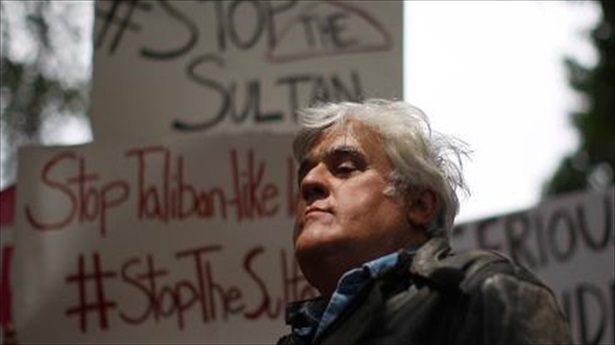UPDATES
Brunei makes its Hollywood debut – Extreme Sharia spreads in Southeast Asia
May 12, 2014 | Glen Falkenstein

It takes a lot to get noticed in Hollywood. Most dream of getting their names up there with the likes of Ellen DeGeneres and Jay Leno. Most, but not Hassanal Bolkiah, the Sultan of Brunei. In 2013 the Sultan proposed a new penal code in line with strict implementation of Islamic or ‘Sharia’ law including harsh penalties such as stoning and amputation for offences including theft and homosexuality.
In response, Hollywood heavyweights Leno and DeGeneres, joined by Stephen Fry, Sharon Osbourne and Richard Branson, staged a public protest and boycott of the Beverly Hills Hotel which is owned by the Sultan. The Beverly Hills City Council even passed a resolution condemning the government of Brunei for the series of laws which impose on Muslims fines and jail terms for promoting other religions or falling pregnant outside of marriage. The Motion Picture and Television Fund refused to do business with Brunei as flogging and death sentences are introduced over the next two years for offences including but not limited to adultery and insulting the Koran.
The new laws are known as the Hudud Laws, referring to the punishments ordained by Sharia law for serious crimes. Many of the laws scheduled to be introduced in Parliament this June will affect both Muslims and non-Muslims, the latter representing one third of Brunei’s population. Members of other religions could be punished for wearing indecent clothing which disgraces Islam or for proselytising their religion.
But though it has gotten much less attention, these reforms are not limited to Brunei and similar proposals are being widely debated in Malaysia. Religious scholars speaking on the Malaysia laws have stated that non-Muslims should not be exempted from severe punishments as this would create an unjust system whereby certain individuals could be exempted from stoning or having their limbs amputated for crimes while others would be liable for these punishments.
As it stands in Malaysia, the laws would not be proscribed for non-Muslims, the rationale being that a Muslim person has chosen Islam and therefore the entirety of Islam including all tenets of Sharia law. However, apostasy, the rejection of Islam, is proscribed as a crime under the proposed laws with opposition to Hudud itself being defined as opposition to Islam.
Furthermore, the proposed laws in Malaysia would also affect non-Muslims; for instance if a non-Muslim woman is sexually assaulted and cannot produce four witnesses to vouch for her, according to Hudud, the assault did not take place and she should then be charged with adultery.
There are increasing numbers of countries implementing Hudud – at the expense of the human rights of Muslims, Christians, women and vulnerable minorities. Pakistan’s ‘Blasphemy Law’ dictates the death penalty for insulting the Muslim Prophet Muhammad and burning the Koran amongst other offences – and is often used as a tool to target minorities. A notable recent case is that of Asia Bibi, a Pakistani Christian woman sentenced to death under the Blasphemy law following an argument with a neighbour over whether water handled by a Christian becomes unclean. Another recent Pakistani case saw a Christian street sweeper sentenced to death after a friend said he blasphemed the Muslim Prophet Muhammad during an argument, and, as a result, a 3000-strong Muslim mob torched Christian homes in the neighbourhood where he lived.
Pakistan has long been subject to international criticism over its human rights record and treatment of its citizens, including in Hollywood. You could say that Pakistan made its debut in Hollywood a long time ago while Brunei is just getting its name up in lights. But it wouldn’t have been the sort of attention that the Sultan was seeking, and Malaysia, which could follow, is hopefully taking note.
Both could perhaps better look to Indonesia as a more appropriate model for today, a country which has a majority Muslim culture and is currently undergoing strong internal debate over democratic reform. Indonesia is not perfect, and it’s still early days for Indonesian democracy, but it does appear to offer an example of major human rights improvements, flourishing Islam, and a largely successful effort to rein in or moderate most of the more extreme and dangerous elements pushing for radical Hudud reforms in places like Malaysia, Pakistan and Brunei.
Glen Falkenstein











